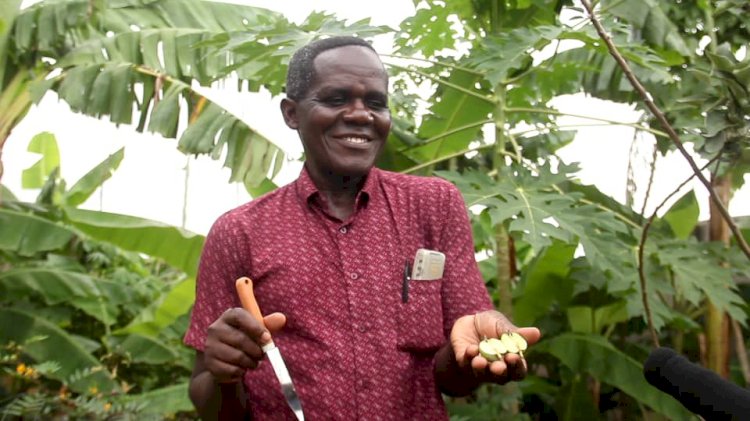Scientists at CSIR-CRI confirm Atimatim Taaboum Apple Tree

The Scientists at Crop Research Institute CRI of the Council for Scientific and Industrial Research CSIR have confirmed an apple tree at Atimatim Taaboum in the Ashanti region. The apple tree grown in a private residence has numerous branches with few fruits after two years of planting. Plant physiologist and Principal Research Scientist at CSIR-CRI Professor Beloved Mensah Dzomeku says there is nothing doubtful about the tree. The grower, Mr. Edward Akwasi Fosu who lives in Belgium first conducted trial for the growth of the tree in the country.

He is said to have collected soil samples from different regions including both temperate and tropical of the world including Ghana to germinate apple seeds. It took 4 days for the seeds to germinate in Ghanaian soil when in other jurisdictions, germination occurred in a minimum of 10 days. In 2016, 10 seedlings were brought into Ghana and planted in a house at Atimatim-
Taaboum. “It started fruiting after two years.” Says Kwaku Asumadu who is a brother of the grower and staff at CSIR-Forest Research Institute. Mr. Asumadu says that all the plants except one were cut down after three years into the experiment due to lack of space in the house. He says the plant has been subjected to various treatments over the years. The final treatment
was scheduled for March, 2020 but due to Covid-19 pandemic his brother could not fly back home. Principal Research Scientist at CSIR-CRI Prof. Beloved Mensah Dzomeku says he has studied apple trees in Germany and that, “Indeed, it is an apple.” He says the trial location is on latitude 06o 46’ 447’’ N and longitude 001o 36’ 611’’ W at an altitude of 288.0m above sea level which is standard average farm land level for the growth of the plant.

The leaves of the plant are about 0.2mm in thickness and the immature fruits averagely 26.8mm in diameter transversely and 18.0mm thick longitudinally. According to Professor Dzomeku transverse and longitudinal sections through the immature fruits revealed all the features of Apple. Professor Dzomeku concludes apples can grow well in Ghana. But this can only be done with scientific support.







